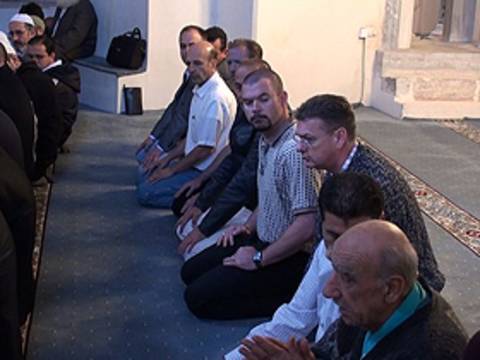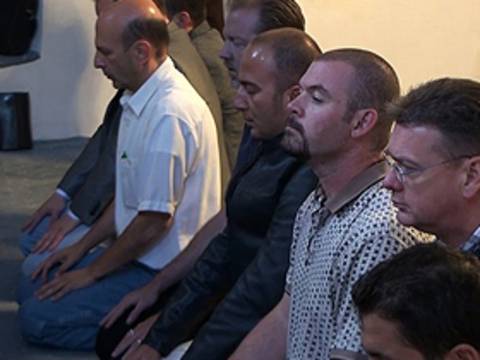Everyone has a desire to establish a bond with Allah. The way to establish that bond is to pray to Allah.
If My servants ask you about Me, I am near. I answer the call of the caller when he calls on Me. They should therefore respond to Me and believe in Me so that hopefully they will be rightly guided. (Surat al-Baqara, 186)
Prayer means "calling on, addressing, making a fervent request, asking for help." In the Qur'an, prayer is also described as "turning to Allah with all one's soul" or the "acknowledgement of one's weaknesses and limited power before Allah's infinite Might, and asking for help from Him."
One can attain value in Allah’s Sight by being aware that one is His servant. That fact is revealed thus in the Qur’an:
‘What has My Lord to do with you if you do not call on Him?’” (Surat al-Furqan, 77)
For that reason, one must turn to Allah, confess one’s errors to Him and seek help from Him alone. Any other form of behavior represents pride before Allah. The Qur’an reveals that the punishment for that pride is hell:
Your Lord says, "Call on Me and I will answer you. Those who are too proud to worship Me will enter hell abject." (Surah Ghafir, 60)
All people need to pray. To think that someone living in poverty and under difficult circumstances has a greater need to pray than a wealthy person is to completely misunderstand the essence of prayer.
It is a grave error for someone who thinks he has achieved all his desires in life to imagine he has no need to pray. Because that would mean that the only reason to pray is to satisfy one’s earthy desires.
The fact is, however, that believers pray for both the life of this world and for the Hereafter. Allah regards both as auspicious for true believers:
… There are some people who say, "Our Lord, give us good in the world." They will have no share in the hereafter. And there are others who say, "Our Lord, give us good in the world, and good in the hereafter, and safeguard us from the punishment of the Fire." They will have a good share from what they have earned. Allah is swift at reckoning. (Surat al-Baqara, 200-202)
People can pray to Allah, our Lord, at any time and in any place they like, for anything they wish. Allah calls attention to the fact that people can pray and remember Him anywhere they wish:
Those who remember Allah, standing, sitting and lying on their sides, and reflect on the creation of the heavens and the earth, [saying]: "Our Lord, You have not created this for nothing. Glory be to You! So safeguard us from the punishment of the Fire. Our Lord, those You cast into the Fire, You have indeed disgraced. The wrongdoers will have no helpers. Our Lord, we heard a caller calling us to faith: "Have faith in your Lord!' and we had faith. Our Lord, forgive us our wrong actions, erase our bad actions from us and take us back to You with those who are truly good. Our Lord, give us what You promised us through Your Messengers, and do not disgrace us on the Day of Resurrection. You do not break Your promise." Their Lord responds to them: "I will not let the deeds of any doer among you go to waste, male or female…" (Surah Al Imran, 191-195)
To call Allah to mind at times of difficulty means that one knows that Allah is one’s only shelter.
It is very hard to escape from a ship that has an accident in the middle of the ocean. One comes face to face with death. None of the natural causes one placed one’s hopes in until then will come to one’s aid.
Someone faced with such a situation begins to pray, in the certainty that Allah exists and never doubting that only He can help.
In praying, one beseeches Allah alone. One realizes that only He can save one from one’s predicament. And one also knows that this is entirely dependent upon His will.
Many people known for their denial of Allah also seek shelter in Allah at such times, “for there is no other refuge than Him.”
As soon as the danger has passed, however, the majority of such people, however, suddenly forget the truths they realized while the danger still persisted. They stop praying to Allah because of the sense of security that relief and the removal of the danger brings with it. This state of mind is described in the Qur’an as follows:
It is He Who conveys you on both land and sea so that when some of you are on a boat, running before a fair wind, rejoicing at it, and then a violent squall comes upon them and the waves come at them from every side and they realize there is no way of escape, they call on Allah, making their religion sincerely His: "If You rescue us from this, we will truly be among the thankful."
But then, when He does rescue them, they become rebellious in the earth without any right to do so. Mankind, your rebelliousness is only against yourselves. There is the enjoyment of the life of the world and then you will return to Us and We will inform you about what you did. (Surah Yunus, 22-23)
The names of Allah teach us His infinite might and sovereignty. Some of the names of Allah are:
AL- ‘ADL : The Just, The Equitable
AL- ‘AFUW : The Pardoner
AL- ‘ALEEM : The All-Knowing
AL- ‘AZEEZ : The Almighty
AL-BARI' : The Maker, the flawless Creator
AL-JABBAR : The Irresistible; The Compeller
AL-QUDDUS : The Holy; The All-Pure, He Who is unsullied by any error or deficiency, the Immaculate
MALIK AL-MULK : The Master of the Kingdom
AR-RAHMAN AR –RAHEEM : The Most Gracious, the Most Merciful, He Who rewards those who use His blessings righteously with infinite blessings
AR-RAZZAQ : He Who supplies all needs, He Who bestows blessings to benefit people
ASH-SHAFI‘ : The Intercessor
AT-TAWWAB : The Acceptor of Repentance
AL-WALEE : The friend of His good servants
By praying to our Lord with these Almighty names, one better comprehends His greatness, proximity, power and mercy. In the Qur’an, too, Allah reveals that He may be prayed to using different names:
To Allah belong the Most Beautiful Names, so call on Him by them…( Surat al-A'raf, 180)
Our Lord is praised using different names in the prayers of the prophets in particular:
He (Solomon) said, "My Lord, forgive me and give me a kingdom the like of which will never be granted to anyone after me. Truly You are the Ever-Giving." (Surah Sad, 35)
"Our Lord, do not make our hearts swerve aside after You have guided us. And give us mercy from You. You are the Ever-Giving." (Surah Al Imran, 8)
He (Moses) said, ‘My Lord, forgive me and my brother and admit us into Your mercy. You are the Most Merciful of the merciful.’ (Surat al-Araf, 151)
Then and there Zechariah called on his Lord and said, ‘O Lord, grant me by Your favor an upright child. You are the Hearer of Prayer.’ (Surah Al ‘Imran, 38)
Believers know that all things are under Allah’s control. No matter how great their desires, they ask them from Allah. They know that if Allah so desires, even seemingly impossible things can happen by His commanding them to “Be!”
For that reason, they regard nothing as an insuperable obstacle to attaining Allah’s blessings. On the contrary, they overcome all difficulties and problems through prayer.










